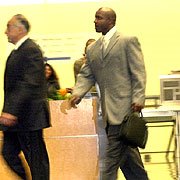 According to Ted Rowlands of CNN, the United States Attorneys' Office in San Francisco is investigating whether Barry Bonds perjured himself while testifying before a grand jury in 2003. During that testimony, Bonds admitted that he had used a clear substance and a cream provided by trainer Greg Anderson, but stated that he believed they were flaxseed oil and arthritis balm. He also disclaimed any knowledge of substance-usage records, such as doping calendars from BALCO which indicated that he had used banned drugs, and denied ever paying Anderson for steroids or knowingly using them. As we discussed last month, the new book "Game of Shadows" paints Bonds as a knowing and habitual user of steroids and performance-enhancing substances.
According to Ted Rowlands of CNN, the United States Attorneys' Office in San Francisco is investigating whether Barry Bonds perjured himself while testifying before a grand jury in 2003. During that testimony, Bonds admitted that he had used a clear substance and a cream provided by trainer Greg Anderson, but stated that he believed they were flaxseed oil and arthritis balm. He also disclaimed any knowledge of substance-usage records, such as doping calendars from BALCO which indicated that he had used banned drugs, and denied ever paying Anderson for steroids or knowingly using them. As we discussed last month, the new book "Game of Shadows" paints Bonds as a knowing and habitual user of steroids and performance-enhancing substances.
Keep in mind, perjury charges are typically very difficult to prove. Perjury is the act of knowingly, intentionally, and materially lying to a court after taking an oath to tell the truth. So the prosecution must establish that a defendant knowingly and intentionally misstated a material fact, rather than having merely suffered from 1) a faulty recollection while answering a question; 2) a misunderstanding of the question being asked; or 3) a misunderstanding of his own response to the question. Moreover, an intentional lie must have a consequential effect on the case's ultimate outcome, a hurdle which can also be difficult to establish.
On the other hand, and assuming that Bonds did in fact lie under oath, his reputation for being meticulous about what goes into his body would seem to undercut any faulty recollection defense. But then again, did he understand the questions being asked of him? And did he fully understand his own answers? And how can the prosecution show that he did?
skip to main |
skip to sidebar
Blog Archive
-
▼
2006
(592)
-
▼
April
(41)
- Mixed Bag
- Leinart's Folly? Knowing When to Say When
- DePaul Sports Law Symposium
- Ballpeace: Doug Mientkiewicz and Red Sox Reach Agr...
- Gas Prices
- Property Taxes
- The Enemy of My Enemy is My Friend: Hunters and En...
- Professional Hockey Player Sues for Workers' Comp
- Hefty Fine (but no suspension) for Penn State Coach
- Illegal Immigration and Bigotry
- Geese and Golden Eggs
- Larry Bird and Legends Wine: Exceeding the Limits ...
- The Cigarette Tax Revisited
- Throwing Games and the NBA Draft Lottery
- Minarchy
- "Family" is a Synonym for Tyranny
- Show Me 97 Percent of The Money: NFL Agent Maximum...
- The Truth About Dave Chappelle
- Perjury Investigation of Barry Bonds: More Bark th...
- The $35,000 Question: Will Lower NBDL Age Limit Ma...
- The Case for Banning Smokeless Tobacco in Major Le...
- Cigarette Taxes
- The Power of Situation: Joakim Noah's Decision to ...
- The Beauty of Bets: Wagers as Compensation for Pro...
- The Unraveling of the Bush Administration
- DVD- V for Vendetta
- (Un)Leveling the Playing Field: Enrollment Multip...
- The Aesthetics of Personal Relationships
- Let's Send Barry Bonds to Russia
- Down with the Count: Do Weigh-In Procedures Actua...
- Defaming or Fitting? The Bobcats Release of Kareem...
- MLS: Reflections on the League’s Appeal to the Mex...
- Justice Scalia to Speak at Mississippi College Sch...
- Nospace: Is MySpace Inappropriate for Student Athl...
- The Grass Was Always Greener: Red Sox Make Progres...
- A Market Solution to Baseball’s “Asterisk” Problem
- Empirical Study on how NCAA and Member Schools Pro...
- Issues of Trust
- Should Sports Teams be Owned by Public Corporations?
- The Immigration Debate
- David Ortiz: Overpaid or Rewarded?
-
▼
April
(41)
Popular Posts
-
After a little over a week since 48 players exchanged numbers with their teams, and according to my research 13 players have signed if you i...
-
This is my opening post on my blog. This blog is going to be about the Media/ Sports/Music/Politicans. I hope ya'all find it interestin...
-
I am going ahead with the idea of facilitating barter exchanges between readers, chosing the old-school method in the interest of simplicit...
-
Male porn stars are famous for their above average endowments. Ron Jeremy is measured at 9.75 inches. Another famous porn star was John Holm...
-
I take what I call a journalistic interest in a variety of sports. If I didn't write, I wouldn't waste my time learning about them. ...
-
Paula Radcliffe is a distance runner who hails from Britain. She is the first woman to ever go below 2:20 for the marathon redefining what w...
-
Today's FT has a special report on Nigeria, and has a very interesting discussion of energy access : Despite average cash injections of...
-
Just wanted to thank everyone who has been apart, visited or entered our contests on this blog and help us get to 30,000. It's not quite...
Copyright © 2011 Sport News Update | Powered by Blogger
Design by Free WordPress Themes | Bloggerized by Lasantha - Premium Blogger Themes | Website Value Calculation Tool





0 comments:
Post a Comment